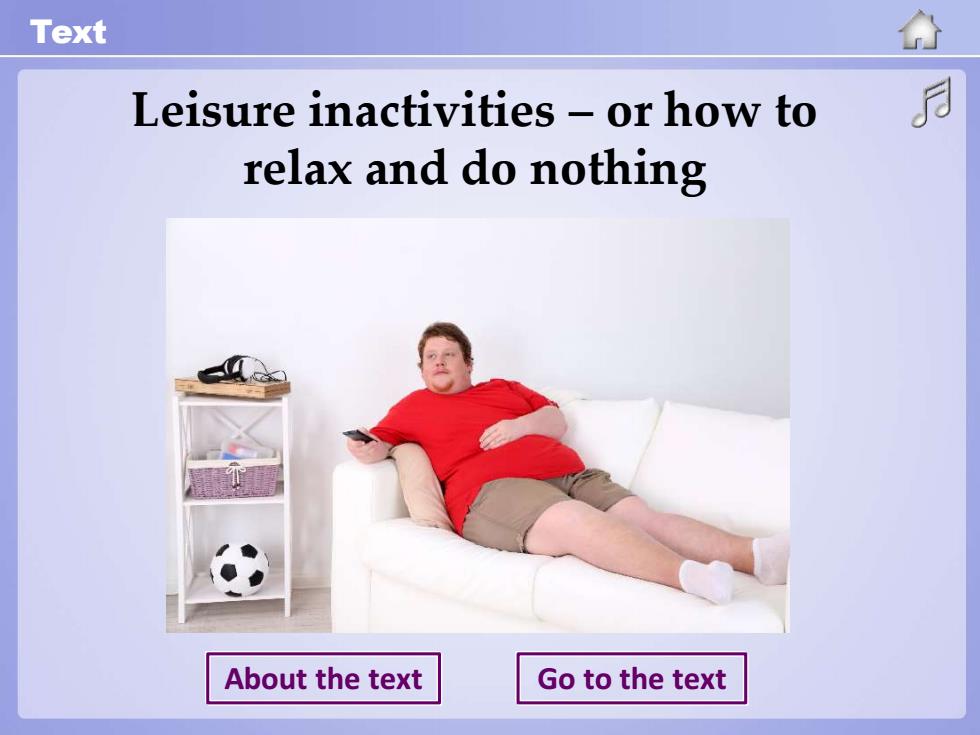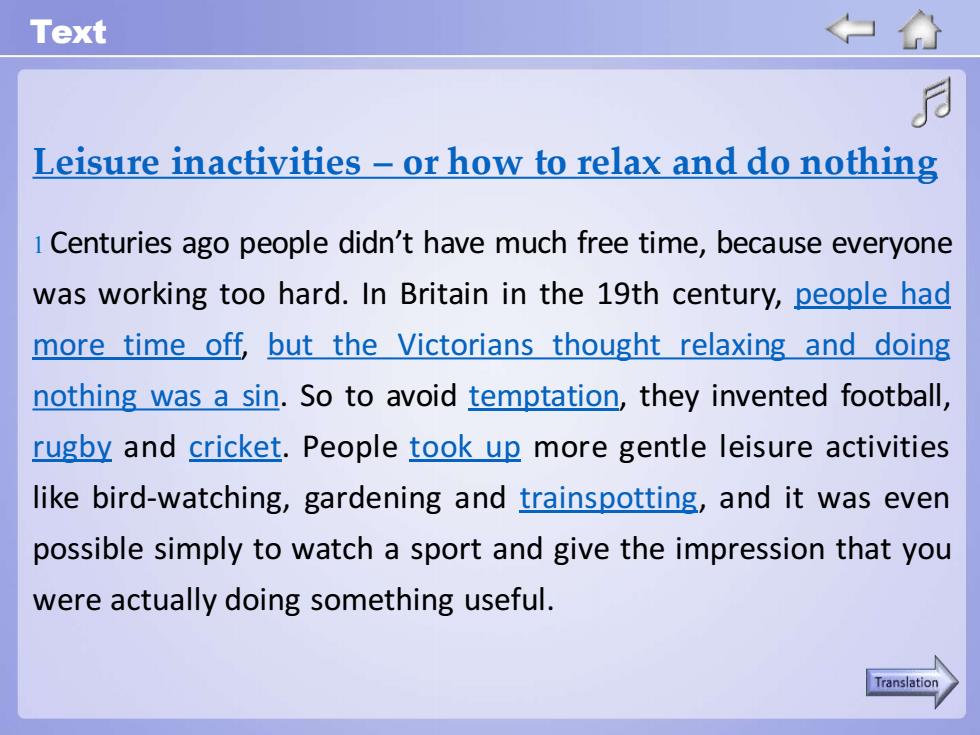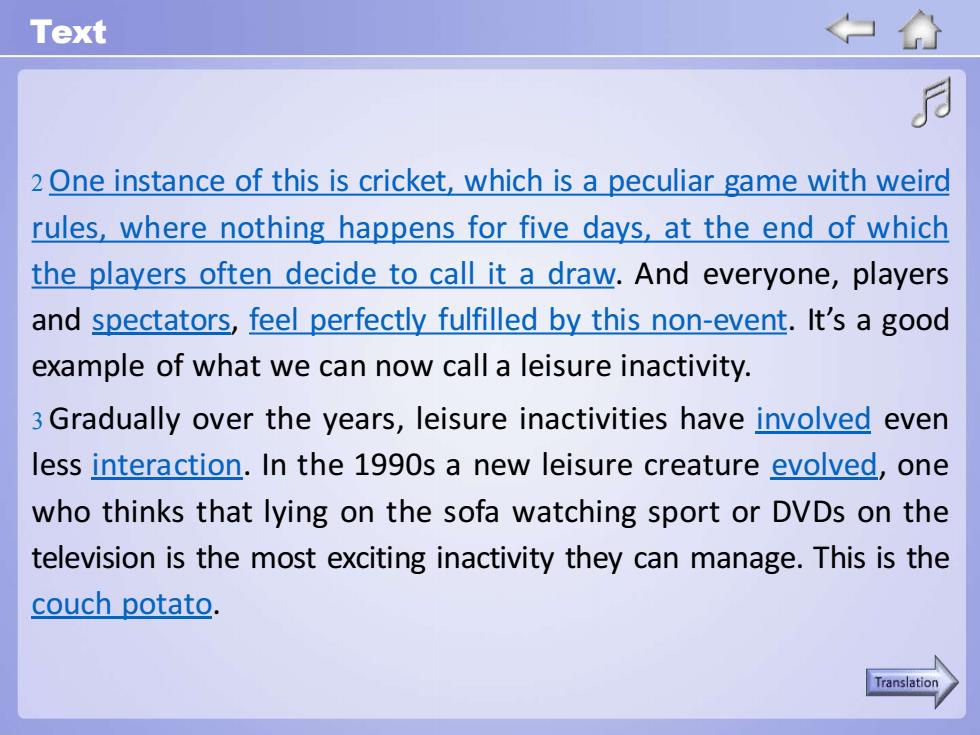
NEWSTANDARDSECOND第二版EDITIONOLLEGE ENGLISH综合教程2Real CommunicationAn Integrated CourseNNU·南京师花大学制作版权所有外语教学与研究出版社ANJINGNORMALUNIVERSITY

TextLeisure inactivities - or how torelax and do nothingAboutthetextGotothetext
Text Leisure inactivities – or how to relax and do nothing About the text Go to the text

TextLeisure inactivities - or how to relax and do nothing1Centuries ago people didn't have much free time, because everyonewas working too hard. In Britain in the 19th century, people hadmore time off, but the Victorians thought relaxing and doingnothing was a sin. So to avoid temptation, they invented footballrugby and cricket. People took up more gentle leisure activitieslike bird-watching, gardening and trainspotting, and it was evenpossible simply to watch a sport and give the impression that youwereactuallydoing something useful.Translation
Leisure inactivities – or how to relax and do nothing 1 Centuries ago people didn’t have much free time, because everyone was working too hard. In Britain in the 19th century, people had more time off, but the Victorians thought relaxing and doing nothing was a sin. So to avoid temptation, they invented football, rugby and cricket. People took up more gentle leisure activities like bird-watching, gardening and trainspotting, and it was even possible simply to watch a sport and give the impression that you were actually doing something useful. Text

Text2Oneinstance of this is cricket,whichisa peculiar gamewith weirdrules, where nothing happens for five days, at the end of whichthe players often decide to call it a draw. And everyone, playersand spectators, feel perfectly fulfilled by this non-event. It's a goodexample of what we can now call a leisure inactivity.3 Gradually over the years,leisure inactivities have involved evenless interaction.In the 1990s a new leisure creature evolved, onewho thinks that lying on the sofa watching sport or DvDs on thetelevision is the most exciting inactivity they can manage. This is thecouchpotatoTranslation
2One instance of this is cricket, which is a peculiar game with weird rules, where nothing happens for five days, at the end of which the players often decide to call it a draw. And everyone, players and spectators, feel perfectly fulfilled by this non-event. It’s a good example of what we can now call a leisure inactivity. 3Gradually over the years, leisure inactivities have involved even less interaction. In the 1990s a new leisure creature evolved, one who thinks that lying on the sofa watching sport or DVDs on the television is the most exciting inactivity they can manage. This is the couch potato. Text

Text4 So who wants to be a couch potato? Well, as a matter of fact, manypeople do, and for understandable reasons. Maybe it's your oneday off in the week. Maybe you just got back from work or school.Maybe you're tired and just want to chill. For the couch potato,every activity is too much trouble, and laziness is an art form.s How do you become a couch potato? It's easy. Sit down in acomfortable place, such as a reclining chair, a beanbag or ... youknew it was coming... a couch. Don't sit on a potato. Make sureyou have everything you need, snacks (especially potato chips- noserious couch potato would eat anything else), drinks, magazinesandatellyTranslation
4 So who wants to be a couch potato? Well, as a matter of fact, many people do, and for understandable reasons. Maybe it’s your one day off in the week. Maybe you just got back from work or school. Maybe you’re tired and just want to chill. For the couch potato, every activity is too much trouble, and laziness is an art form. 5 How do you become a couch potato? It’s easy. Sit down in a comfortable place, such as a reclining chair, a beanbag or . you knew it was coming . a couch. Don’t sit on a potato. Make sure you have everything you need, snacks (especially potato chips – no serious couch potato would eat anything else), drinks, magazines and a telly. Text